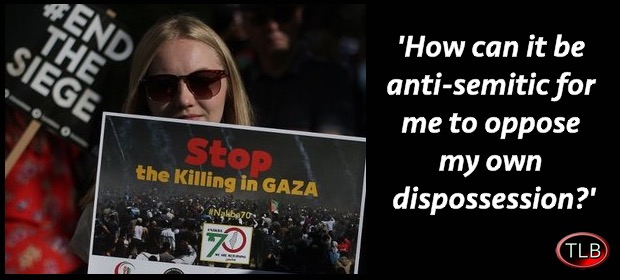
Why calling Israel an apartheid state or racist is not anti-Semitic
For Palestinians and their supporters, a definition of anti-Semitism cannot be disconnected from the history and nature of Israel’s founding and ongoing policies
BEN WHITE
The frenzied debate over the International Holocaust Remembrance Alliance (IHRA)’s definition of anti-Semitism – or more precisely, definition and illustrative examples – has centred on whether the document restricts criticism of the state of Israel and delegitimises solidarity with the Palestinians.
Some, like The Guardian’s columnist Jonathan Freedland, writing last Friday, have defended the IHRA document from concerns it “will silence the pro-Palestinian voice” by resorting to disingenuous and implausible interpretations of the text, and its implications.
“You can, if you want, say everything the state of Israel has done since its birth has been racist,” Freedland claimed. “All it prohibits is branding as a racist endeavour ‘a state of Israel’ – the principle that Jews, like every other people on Earth, should have a home and refuge of their own”.
A weak position
First, let us recall the precise text in question, part of what is presented in the IHRA document as a list of examples of contemporary anti-Semitism: “Denying the Jewish people their right to self-determination, eg., by claiming that the existence of a State of Israel is a racist endeavour”.
To suggest significance in reference to “a”, not “the”, State of Israel is a very weak position. The IHRA document features nine references to Israel in total, and all of them clearly refer to the actual existing State of Israel, not a hypothetical one (which, of course, would not make any sense).
Similarly, a draft working definition of anti-Semitism circulated (then ditched) by the now defunct European Monitoring Centre on Racism and Xenophobia – on which the IHRA document is heavily based – also makes clear that the example in question refers to the actual State of Israel.
But that’s not all. The IHRA document prefaces the list of illustrations by saying that they “could” be examples of anti-Semitism, “taking into account the overall context”. These qualifications are stressed by those who seek to downplay the potential for the document to have a chilling effect.
However, given that this list includes clear-cut cases of anti-Semitism such as “calling for, aiding, or justifying the killing or harming of Jews” and Holocaust denial, it is no wonder that the qualifying “could” is often omitted in practice for all the illustrative examples.
And, in practice, the IHRA document is already being used to attack Palestinians and their allies, and to claim that describing Israel in terms of apartheid or settler colonialism is “anti-Semitic”.
Instructive examples
Last year, officials at the University of Central Lancashire cancelled an “Israeli Apartheid Week” panel event on the basis it supposedly contravened the IHRA definition. Earlier this year, the Campaign Against Anti-Semitism trumpeted “similar successes” in getting student-run events cancelled.
Campaigners from the UK Zionist Federation, the Britain Israel Communications and Research Centre (BICOM), along with MPs like Labour’s Joan Ryan and the Tories’ Matthew Offord, also petitioned the government to ban “Israeli Apartheid Week” events on campuses – again, citing the IHRA definition.
 Pro-Israeli demonstrators are shepherded away by police from pro-Palestinian protesters on Whitehall opposite Downing Street in central London on 7 April, 2018 (AFP)
Pro-Israeli demonstrators are shepherded away by police from pro-Palestinian protesters on Whitehall opposite Downing Street in central London on 7 April, 2018 (AFP) Even the Board of Deputies of British Jews – a supporter of the IHRA document – has acknowledged that “there is a worrying resistance from universities to adopting it [the definition] and free speech is given as the primary reason for their reluctance“.
Just this week, a Conservative councillor in Barnet – the first local authority to adopt the IHRA definition – moved a motion that seeks to ban any groups or even individuals who support the Palestinian-led Boycott, Divestment, Sanctions (BDS) campaign from renting council facilities.
In another instructive example this year, officials from organisations such as the American Jewish Committee and European Jewish Congress tried to get Palestinian BDS activist and human rights defender Omar Barghouti banned from speaking in the European Parliament.
In a co-signed letter, the organisations claimed that “BDS activists consistently engage in practices, which are considered anti-Semitic according to the International Holocaust Remembrance Alliance (IHRA) working definition of antisemitism”, duly citing the example of Israel as a “racist endeavour”.
Again, note how, in practice, the qualifying “could” is rendered immaterial; a Palestinian who seeks to end the violation of his people’s rights is unambiguously smeared as a racist.
Imprecise and poorly drafted
Interestingly, two key individuals involved in the formation of the IHRA text also recognise its impact on freedom of speech, albeit from very differing perspectives.
Kenneth Stern, a key drafter of the EUMC definition, later bemoaned how pro-Israel groups used the document “with the subtlety of a mallet”. In November, Stern told the US Congress that enshrining the definition in legislation would “chill” the “political speech” of pro-Palestinian students.
If Stern has expressed unhappiness at how the EUMC text was subsequently used (albeit without acknowledging his role in facilitating such an outcome), then the architect of the IHRA document is positively delighted at its role in censoring Palestinian points of view.
Mark Weitzman, who works at the US-based Simon Wiesenthal Centre, was the “principal figure” in getting the IHRA document proposed and adopted. When the University of Central Lancashire cancelled the Israeli Apartheid Week event last year, Weitzman hailed the decision as “firm evidence that this internationally accepted definition can play a vital role in the fight against anti-Semitism”.
Despite this evidence, some claim that those using the IHRA document to censor are simply not applying it “properly“. But, at best, this merely confirms the criticisms levelled by the likes of David Feldman, director of the Pears Institute for the study of Antisemitism, and Geoffrey Bindman QC – namely, that the definition is “bewilderingly imprecise” and “poorly drafted”.
 A pro-Palestine demonstrator is led away by police officers as Israel supporters stage a demonstration outside the Israeli embassy in London on July 2014 (AFP)
A pro-Palestine demonstrator is led away by police officers as Israel supporters stage a demonstration outside the Israeli embassy in London on July 2014 (AFP) There is also nothing contradictory in the claim that an imprecise document can be used to censor (as Freedland apparently believes). On the contrary, as we have seen in efforts to legislate against “extremism”, vague language leads directly to concerns over an impact on free speech.
Ethnic statehood
Finally, let us return to the claim advanced by Freedland, and others, that the IHRA example in question is about a “principle” – namely “that Jews, like every other people on Earth, should have a home and refuge of their own”.
Here, and not for the first time, Freedland uses terms like “home” and “refuge” when what is actually being discussed is a state. The IHRA document is not about a “principle” – it is about conflating self-determination not just with statehood, but with ethnic statehood.
For Palestinians, the consequences of such a conflation are very much not theoretical: the creation of the State of Israel as a “Jewish state” meant ethnic cleansing and forced exile, and its continued existence as such means ongoing dispossession, discrimination and dehumanisation.
As two London-based Palestinian human rights advocates noted recently: “For Palestinians, the idea that claiming the ‘existence of the State of Israel is a racist endeavour’ is in itself anti-Semitic is disconnected from the history and nature of Israel’s founding and ongoing policies”.
Reading a letter published in The Guardian this week by a group of British-Palestinians, asserting their right to have the “reality” of their experience past and present in “the public space”, I remembered something a Palestinian scholar told me when I was a university undergraduate.
“How can it be anti-Semitic for me to oppose my own dispossession?,” he asked rhetorically. “And by extension,” he added, “how can it be anti-Semitic for you to have solidarity with me?” Indeed. Yet this is the absurd equation Israel and its friends have always tried to insist on, and which must continuously be resisted.
************
Original article
ER recommends other articles by Middle East Eye
Ben White is the author of the new book Cracks in the Wall: Beyond Apartheid in Palestine/Israel. He is a freelance journalist and writer and his articles have been published by Al Jazeera, al-Araby, Huffington Post, the Electronic Intifada, the Guardian’s Comment is Free and more.
Featured photo: Pro-Palestine demonstrators hold placards and wave flags during a protest opposite the entrance to Downing Street in central London on 15 May 2018 (AFP)




